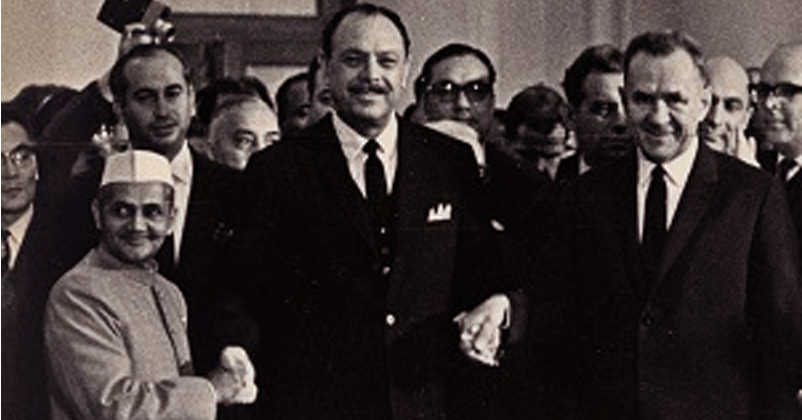SOURCE: AFI


In a potential escalation of diplomatic tensions, recent reports suggest that Pakistan is contemplating withdrawing from the Tashkent Agreement of 1966, a historic peace accord signed with India to end the 1965 war. This development follows the Shimla Agreement of 1972, which has long served as the cornerstone of bilateral relations between the two nations. The move, reportedly under consideration in response to India’s actions on the Indus Waters Treaty and heightened tensions after the 2025 Pahalgam terror attack, could have significant implications for South Asian geopolitics.
The Tashkent Agreement, signed on January 10, 1966, in Tashkent, Uzbekistan, was mediated by the Soviet Union to resolve the 1965 Indo-Pakistani War. Key provisions included the withdrawal of forces to pre-war positions, a commitment to non-interference in each other’s internal affairs, and the restoration of diplomatic and economic ties. However, the agreement failed to address the Kashmir dispute, leading to widespread criticism in both countries for its perceived shortcomings.
The Shimla Agreement, signed on July 2, 1972, after the 1971 war and the creation of Bangladesh, shifted the focus to bilateral negotiations. It established the Line of Control (LoC) in Kashmir, emphasized peaceful dispute resolution, and discouraged third-party intervention, effectively overshadowing the Tashkent Agreement. Recent developments, including Pakistan’s suspension of the Shimla Agreement in April 2025 following India’s response to the Pahalgam attack, have reignited discussions about historical treaties.
As of April 25, 2025, posts on X and some news reports indicate that Pakistan is considering withdrawing from the Tashkent Agreement alongside its suspension of the Shimla Agreement. This follows India’s decision to suspend the Indus Waters Treaty (IWT) and implement punitive measures, such as downgrading diplomatic ties and closing the Attari-Wagah border, in response to the Pahalgam terror attack, which killed 26 civilians. Pakistani sources argue that India’s actions undermine bilateral frameworks, prompting Islamabad to reconsider its commitments to both Shimla and Tashkent.
The Tashkent Agreement’s relevance has waned over the decades, as the Shimla Agreement became the primary framework for India-Pakistan relations. However, withdrawing from Tashkent could serve as a symbolic gesture, signaling Pakistan’s intent to reject historical peace commitments and potentially internationalize the Kashmir issue. Pakistani analysts suggest that abandoning these agreements could remove obligations like non-interference and peaceful dispute resolution, opening the door for unilateral actions or third-party mediation.
Withdrawing from the Tashkent Agreement would be largely symbolic, given its diminished practical relevance post-Shimla. However, it could further strain India-Pakistan relations, already at a low point due to the Pahalgam attack and India’s suspension of the IWT. The move might be perceived as Pakistan rejecting the principles of non-interference and peaceful dialogue enshrined in the 1966 accord.
The Shimla Agreement’s suspension has already raised questions about the validity of the LoC. A withdrawal from Tashkent could reinforce Pakistan’s push to internationalize the Kashmir dispute, challenging India’s stance that the issue is bilateral. This could lead to increased diplomatic friction and potential escalation along the LoC.
The abeyance of both agreements risks destabilizing the region. The Tashkent Agreement’s commitment to non-interference and peaceful resolution, though outdated, aligns with the UN Charter’s principles. Its withdrawal could signal a broader rejection of diplomatic mechanisms, increasing the likelihood of military posturing, as evidenced by reports of Pakistan deploying military assets near the border.
Experts caution that Pakistan’s move could backfire diplomatically. India may refuse structured dialogue without a bilateral framework, and the international community, which respects Shimla’s bilateral approach, might view Pakistan’s actions as destabilizing. This could isolate Pakistan diplomatically, especially amid India’s growing global influence.
NOTE: AFI is a proud outsourced content creator partner of IDRW.ORG. All content created by AFI is the sole property of AFI and is protected by copyright. AFI takes copyright infringement seriously and will pursue all legal options available to protect its content.